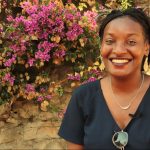For our 50th issue, current editor Sarah Gerwens talked to some of the people who made all of this possible: E&M co-founder Chris Wratil and first-generation editors Lucy Duggan and Fabian Pregel.
It takes a village to raise a child, supposedly. And to publish a transnational youth magazine? It takes a whole continent and generations of editors and website designers. However, first of all, it takes a group of people with an idea and the passion to turn it into reality.
The idea for Europe & Me was first conceived in the context of the Studienkolleg zu Berlin, a German scholarship initiative. The programme brought together 30 university students, half from Germany and half from the rest of Europe, to spend a year thinking about Europe and coming up with transnational projects. E&M was one of them. In the 2007 edition of the Studienkolleg, Kristin Kruthaup had the idea of starting a European magazine and together with Eva Sabloska, Margarita Ivanova, Hanna Pilawa, and Christopher Wratil she did exactly that. Lucy Duggan, Fabian Pregel, and Martin Maas joined the project shortly after. Fifty issues and twelve years of E&M later, we checked in with Chris, Lucy and Fabian to talk about how (and why) to start a European magazine and what E&M might look like another fifty issues from now.
E&M: Tell me a little about yourself – who you were when E&M started and where you are now.
Chris: When E&M started, I was a bachelor’s student in my second year at the Free University of Berlin studying Political Science. I had been quite bored during my first year, and I wanted to do something related to Europe, so I applied to the Studienkolleg. Where am I today? I’m lecturer in European Politics at UCL [University College London].
Lucy: When E&M first started, I was a student on my year abroad in Berlin: I was studying German in Oxford. Now I’m a writer and translator living in Brandenburg. I’m working on my second novel at the moment.
Fabian: I had moved from Germany to the UK about a year before [the founding of E&M in 2007] and was in my second year of an undergraduate degree at Oxford. Today, I still live in the UK and work as an investor in tech start-ups.
E&M: What was putting together the first issues like?
Chris: We met in September 2007 and we wanted to publish the first issue at the end of the Studienkolleg programme in summer 2008. Throughout that year, we worked like crazy, I think each of us invested at least twenty hours, rather thirty a week.
Lucy: What I really remember are the long skype calls to decide what to cover and figure out whether we had enough articles for each section. I also remember the rush at the last minute to put the new issue together and get it online!
Fabian: At the very beginning, there were a lot of conceptual questions. For example, whether to write only in English or also in other languages. Once those were settled, a lot of practical stuff needed to be done – organising content, editing, proofreading, website layout… It was a hectic time, but also an absorbing and energetic one. When we put the first edition online, we organised a press conference in Berlin on the day of the launch, and a launch party in the evening.
E&M: Why did you get involved with E&M?
Chris: When we talk about Europe in the news, we usually talk about Europe in political terms, about what is happening in the EU or what is happening in other countries. We wanted to broaden this understanding of Europe, because every aspect of life has some transnational perspective to it.
Lucy: Europe’s mainstream media landscape was (and still is) dominated by national media outlets, with very few transnational magazines. We thought that young people would be more likely to identify with Europe, or develop a “European identity”, if they had a magazine that reflected them as young Europeans, rather than as being defined by their national identity.
…every aspect of life has some transnational perspective to it
Fabian: I really believed in the cause – trying to promote transnational thinking by creating more European media for young people. Europe does not have to mean ‘European Union’ but rather touches the lives of young Europeans in many more, and positive, ways. Finally, I hoped E&M could play a small part in educating readers and training young journalists.
E&M: Which roadblocks did you have to overcome (if any)?
Chris: A huge challenge was, of course, to program and then design a website. That was much harder in 2007/2008 than it is today. In internet years, our first website was like a dinosaur.
Lucy: We had loads of mini emergencies – sometimes authors dropped out or submitted shockingly bad articles; sometimes editors were overwhelmed by stress. But somehow we got through it!
Fabian: Yes, we had a few roadblocks! Just one example: The content management system of our website got infected with a virus. We removed it and upgraded our software, but the virus kept coming back. It took quite some time until we (for the time being!) defeated it.
the cause – trying to promote transnational thinking by creating more European media for young people
E&M: For all the young journalists and writers out there, what does one need to start a magazine?
Chris: You need a lot of passion, you need to be visionary, and you have to be willing to work hard.
Lucy: On one hand, it’s simple: you just have to have enthusiasm! To be a writer, you have to want to write. That’s it. On the other hand, it’s complicated: you need a team of people that you can totally rely on. You need to be able to criticize the other people on your team, and you need to be able to deal with criticism. You need an idea. You need to believe that no one else has done this before you.
Fabian: You need people who are intrinsically motivated by the cause and want to be part of it.
E&M: Looking back at E&M’s early days, is there anything you’d do differently if you could?
Chris: I think it would have been great if we could have gotten more people from outside of Germany. We did try to diversify, but it wasn’t easy. And, we initially didn’t have any clear guidelines outlining what editors are supposed to do or how we would deal with conflicts, and I think that became problematic at some points.
Lucy: I wish that as an editor, I had been more critical, thoughtful about the actual concept of European identity. I’m much more aware now of the way that some people are excluded from Europeanness – migrants are left to die in the Mediterranean, for example. We did write about this in the magazine, but it took me a long time to realize that it wasn’t an isolated issue, but a fundamental problem: in practice, in the present, the idea of a “European identity” is not a perfect alternative to national identity. It is exclusive and limiting, too.
Fabian: Really good question! In a sense, I think the answer is: not much. What I would say though is that I feel Europe & Me should have been much more ambitious, we should have aimed to have a far bigger impact. The current resurgence of nationalism, in a way, shows our limited influence.
E&M: What did or do you like the most about the magazine?
Chris: That it still exists. That sounds weird, but it’s very hard to run such a magazine for twelve years, from generation to generation, with an ever-changing group of people.
Lucy: I liked that it had a sense of humour! I liked the fact that it was sometimes written in “European English” rather than British English. I liked the kaleidoscopic range of topics.
And what I like about it now? I like the fact that it’s survived for more than ten years! I also love the new layout. It makes me happy to see that some elements have remained unchanged and editors still answer the same questions in the “About Me” section – while other aspects have been modernised and made smoother and more exciting.
Fabian: I think what has kept [everyone involved with E&M] going was mostly two things: a strong belief in the cause and a very strong social bond that developed between the editors. Even today, 13 years later, some of my best friends are the people involved early on in Europe & Me.
E&M: Anything you’d like to see E&M do or cover in the course of the next fifty issues?
Chris: I’ll just be happy if the magazine still exists in 12 years. And it’s not up to me to say this, it’s up to the younger generations, people in their twenties and early thirties to say what this magazine should be about, so whatever it is, I’m excited to see it.
Lucy: I always felt that E&M could do with more direct reportage and some articles could benefit from quoting lots of different voices. In the future, I’d also love to see more coverage of the climate crisis, and the transnational groups of activists who are fighting for climate justice. And as a writer and book-lover, I’d love more literary topics.
Fabian: I’d encourage the current team to be bold – feel free to modify the magazine to keep it relevant for today and the future, even if it means radical change!
Many thanks to Chris, Lucy, and Fabian. Answers have been edited for brevity and clarity. The interviews were conducted separately and answers were placed together ex post facto.
Cover photo: Kendall Scott (Unsplash), Unsplash licence










